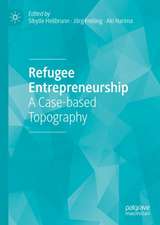Entrepreneurship in Transition Economies: Diversity, Trends, and Perspectives: Societies and Political Orders in Transition
Editat de Arnis Sauka, Alexander Chepurenkoen Limba Engleză Hardback – 7 iul 2017
The first part of the book focuses on theoretical considerations regarding the establishment of sustainable entrepreneurial ecosystems and private business. In turn, the second part offers cross-border studies of entrepreneurial environments and activities, while the third and fourth present case studies on the current state and unique characteristics of entrepreneurship in various countries of the CEE and CIS as well as Georgia and Ukraine. Finally, the last parts discuss the role of institutions and policy recommendations.
| Toate formatele și edițiile | Preț | Express |
|---|---|---|
| Paperback (1) | 734.44 lei 6-8 săpt. | |
| Springer International Publishing – 4 aug 2018 | 734.44 lei 6-8 săpt. | |
| Hardback (1) | 1012.84 lei 6-8 săpt. | |
| Springer International Publishing – 7 iul 2017 | 1012.84 lei 6-8 săpt. |
Din seria Societies and Political Orders in Transition
- 20%
 Preț: 1384.61 lei
Preț: 1384.61 lei - 24%
 Preț: 572.28 lei
Preț: 572.28 lei - 18%
 Preț: 783.35 lei
Preț: 783.35 lei - 18%
 Preț: 957.62 lei
Preț: 957.62 lei - 18%
 Preț: 961.72 lei
Preț: 961.72 lei - 15%
 Preț: 641.03 lei
Preț: 641.03 lei - 15%
 Preț: 647.92 lei
Preț: 647.92 lei - 15%
 Preț: 697.47 lei
Preț: 697.47 lei - 15%
 Preț: 653.33 lei
Preț: 653.33 lei - 15%
 Preț: 636.45 lei
Preț: 636.45 lei - 15%
 Preț: 696.18 lei
Preț: 696.18 lei - 15%
 Preț: 641.03 lei
Preț: 641.03 lei - 18%
 Preț: 722.12 lei
Preț: 722.12 lei - 18%
 Preț: 781.31 lei
Preț: 781.31 lei - 5%
 Preț: 715.35 lei
Preț: 715.35 lei - 18%
 Preț: 723.56 lei
Preț: 723.56 lei - 18%
 Preț: 785.11 lei
Preț: 785.11 lei -
 Preț: 382.75 lei
Preț: 382.75 lei - 18%
 Preț: 784.13 lei
Preț: 784.13 lei - 18%
 Preț: 783.35 lei
Preț: 783.35 lei - 18%
 Preț: 730.47 lei
Preț: 730.47 lei
Preț: 1012.84 lei
Preț vechi: 1235.17 lei
-18% Nou
Puncte Express: 1519
Preț estimativ în valută:
193.80€ • 203.08$ • 160.22£
193.80€ • 203.08$ • 160.22£
Carte tipărită la comandă
Livrare economică 11-25 aprilie
Preluare comenzi: 021 569.72.76
Specificații
ISBN-13: 9783319573410
ISBN-10: 3319573411
Pagini: 444
Ilustrații: XIII, 444 p. 49 illus., 19 illus. in color.
Dimensiuni: 155 x 235 mm
Greutate: 0.82 kg
Ediția:1st ed. 2017
Editura: Springer International Publishing
Colecția Springer
Seria Societies and Political Orders in Transition
Locul publicării:Cham, Switzerland
ISBN-10: 3319573411
Pagini: 444
Ilustrații: XIII, 444 p. 49 illus., 19 illus. in color.
Dimensiuni: 155 x 235 mm
Greutate: 0.82 kg
Ediția:1st ed. 2017
Editura: Springer International Publishing
Colecția Springer
Seria Societies and Political Orders in Transition
Locul publicării:Cham, Switzerland
Cuprins
Part I. Different Parthways: Concepts and Theories.- 1. Introduction: Systematic ‘transition’ and entrepreneurship theory.- 2. Staying in the Family: The impact of institutions and mental models on entrepreneurship development in post-Soviet transition countries.- Part II. Entreprenuurship Ecosystems: Cross Country Analysis.- 3. A multidimensional, comparative analysis of the regional entrepreneurship performance in the Central and Eastern European EU member countries.- 4. Institutions and export performance in 26 transition economies.- 5. Technology-Driven Internationalization. Central-Eastern European Perspective.- 6. Is innovation a determinant for SME performance? Cross-country analysis of the economies of former USSR countries.- Part III. Country Studies from the CEE region.- 7.Entrepreneurship in Estonia: combination of political and entrepreneurial agenda.- 8. The business cycle and early-stage entrepreneurship in Latvia.- 9. The role of education on entrepreneurship in Lithuania.- 10. Entrepreneurship ecosystem and policy development in Slovenia.- 11. Entrepreneurship in Poland- determinants and development perspectives.- 12. Entrepreneurship development in the Czech Republic.- 13.Entrepreneurship development in Slovakia.- 14. The Network Entrepreneur in Small Businesses: The Bulgarian Case.- part IV. Country Studies: Evidence from Selected CIS Countries, Georgia and Ukraine.- 15. Entrepreneurial intentions and initiatives in Georgia. 16. The path of Belarusian entrepreneurship to a socially oriented market economy.- 17. Small and medium enterprises' sector in an adverse business environment of Ukraine: the role of cooperation.- 18. Cross-regional variations in the motivation of entrepreneurial activity in Russia: determining factors.- Part V. Role of Institutions: Special Topics.- 19. The Entrepreneurial role of families in transitional economies: the case of Lithuania.- 20.The impact of competition on the economic behavior and performance of industrial SMEs in Russia.- 21. Motivation of women business owners: case of Russia and Norway.- 22. Entrepreneurial potential in the informal freelance economy: evidence from the Russian-language Internet.- Part VI. Conclusions and Policy Suggestions.- 23. Diverging paths of entrepreneurship in transition countries. A comparative view.
Notă biografică
Dr. Arnis Sauka is an Associate Professor and Director of the Centre for Sustainable Business at the Stockholm School of Economics in Riga. Arnis has a Ph.D. from the University of Siegen (Germany) and has been a Visiting Scholar at Jönköping International Business School (Sweden) and University College London (U.K.). His academic research findings, which deal with the shadow economy, tax morale, competitiveness, social responsibility, internationalisation of companies and entrepreneurship policies, have been published in a number of peer-reviewed journals and books. Arnis has also been extensively involved in applied research, including studies contracted by the OECD and various industry associations and NGOs in the Baltic countries.
Prof. Alexander Chepurenko is Head of the Sociology department of the National research university Higher School of Economics (Moscow), he has over 25 years of experience incomparative analysis of transitional societies, focusing especially on entrepreneurship and private sector development in CIS and CEE economies. He contributed to several monographs on socio-economic models, SME and SME policy in Russia and former Socialist countries. Participated in several international projects, among them the Global Entrepreneurship Monitor (2006-2011), is member of international academic associations and societies (ESBE, EACES).
Textul de pe ultima copertă
This book presents a state-of-the-art portrait of entrepreneurship in the transition economies of Central and Eastern Europe (CEE) and the Commonwealth of Independent States (CIS) as well as Georgia and Ukraine. Based on new empirical evidence, it highlights major trends in, characteristics and forms of entrepreneurship common to countries in transition. The contributions cover topics such as levels of opportunity-based entrepreneurship, incentives for innovation, dominance of large-scale international corporations, the role of family businesses, and opportunities for grass-roots entrepreneurship.
The first part of the book focuses on theoretical considerations regarding the establishment of sustainable entrepreneurial ecosystems and private business. In turn, the second part offers cross-border studies of entrepreneurial environments and activities, while the third and fourth present case studies on the current state and unique characteristics of entrepreneurship in various countries of the CEE and CIS. Finally, the last parts discuss the role of institutions and policy recommendations.
The first part of the book focuses on theoretical considerations regarding the establishment of sustainable entrepreneurial ecosystems and private business. In turn, the second part offers cross-border studies of entrepreneurial environments and activities, while the third and fourth present case studies on the current state and unique characteristics of entrepreneurship in various countries of the CEE and CIS. Finally, the last parts discuss the role of institutions and policy recommendations.
Caracteristici
Presents a state-of-the-art portrait of entrepreneurship in transition economies Highlights major trends in entrepreneurship common to countries in transition from socialist planned economics to market economies Offers case studies on various countries of the CEE and CIS

















